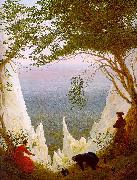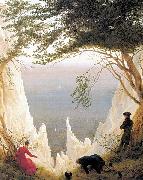Wholesale Oil Painting Reproductions No Minimum and Door to Door! |
|||||||||||
|
|
|||||||||||

|
|||||||||||
|
|
|
||||||||
All Caspar David Friedrich Oil Paintings |
||||||||
|
|
||||||||
|
|
||||||||
|
Artist Introduction: 1774-1840 Caspar David Friedrich Locations German painter, studied art at Copenhagen, and in 1798 settled in Dresden. Friedrich painted chiefly landscapes and seascapes, with and without figures, architectural pictures, including a few of Dresden, and some religious subjects. Religious feeling and symbolism permeate his œuvre, of which the seascape with figures, Die Lebensstufen, is a characteristic example. He possessed considerable power to convey mood in landscape. Almost forgotten in the 19th c. and early 20th c., interest in his work increased considerably in the mid-20th c. He is hardly represented in Britain, but an exhibition of 112 of his pictures at the Tate Gallery in 1972 attracted much attention. F. G. Kersting was a friend of Friedrich. |
||||||||
|
|
||||||||
|
Chalk Cliffs on Rugen Painting ID:: 1268 |
1818
Oskar Reinhart Foundation, Winterthur |
|||||||
Height Width |
INS/CM Quality |
|||||||
|
X |
| |||||||
|
|
||||||||
All Caspar David Friedrich Oil Paintings |
||||||||
|
|
||||||||
|
|
||||||||
|
Artist Introduction: 1774-1840 Caspar David Friedrich Locations German painter, studied art at Copenhagen, and in 1798 settled in Dresden. Friedrich painted chiefly landscapes and seascapes, with and without figures, architectural pictures, including a few of Dresden, and some religious subjects. Religious feeling and symbolism permeate his œuvre, of which the seascape with figures, Die Lebensstufen, is a characteristic example. He possessed considerable power to convey mood in landscape. Almost forgotten in the 19th c. and early 20th c., interest in his work increased considerably in the mid-20th c. He is hardly represented in Britain, but an exhibition of 112 of his pictures at the Tate Gallery in 1972 attracted much attention. F. G. Kersting was a friend of Friedrich. |
||||||||
|
|
||||||||
|
|
Chalk Cliffs on Rugen Painting ID:: 58863 |
Chalk Cliffs on Rugen, (1818). 90.5 ?? 71 cm. Museum Oskar Reinhart am Stadtgarten, Winterthur, Switzerland. Friedrich married Christiane Caroline Bommer in 1818, and on their honeymoon they visited relatives in Neubrandenburg and Greifswald. This painting celebrates the couple's union |
||||||
Height Width |
INS/CM Quality |
|||||||
|
X |
| |||||||
|
|
||||||||
All Caspar David Friedrich Oil Paintings |
||||||||
|
|
||||||||
|
|
||||||||
|
Artist Introduction: 1774-1840 Caspar David Friedrich Locations German painter, studied art at Copenhagen, and in 1798 settled in Dresden. Friedrich painted chiefly landscapes and seascapes, with and without figures, architectural pictures, including a few of Dresden, and some religious subjects. Religious feeling and symbolism permeate his œuvre, of which the seascape with figures, Die Lebensstufen, is a characteristic example. He possessed considerable power to convey mood in landscape. Almost forgotten in the 19th c. and early 20th c., interest in his work increased considerably in the mid-20th c. He is hardly represented in Britain, but an exhibition of 112 of his pictures at the Tate Gallery in 1972 attracted much attention. F. G. Kersting was a friend of Friedrich. |
||||||||
|
|
||||||||
|
|
Chalk Cliffs on Rugen Painting ID:: 72591 |
ca. 1818(1818)
Oil on canvas
90.5 X 71 cm (35.63 X 27.95 in)
cjr |
||||||
Height Width |
INS/CM Quality |
|||||||
|
X |
| |||||||
|
|
||||||||
|
Prev Next
|
||||||||
|
|
||||||||
|
Related Paintings to Caspar David Friedrich :. |
||||||||
|
|
||||||||
|
CONTACT US |



